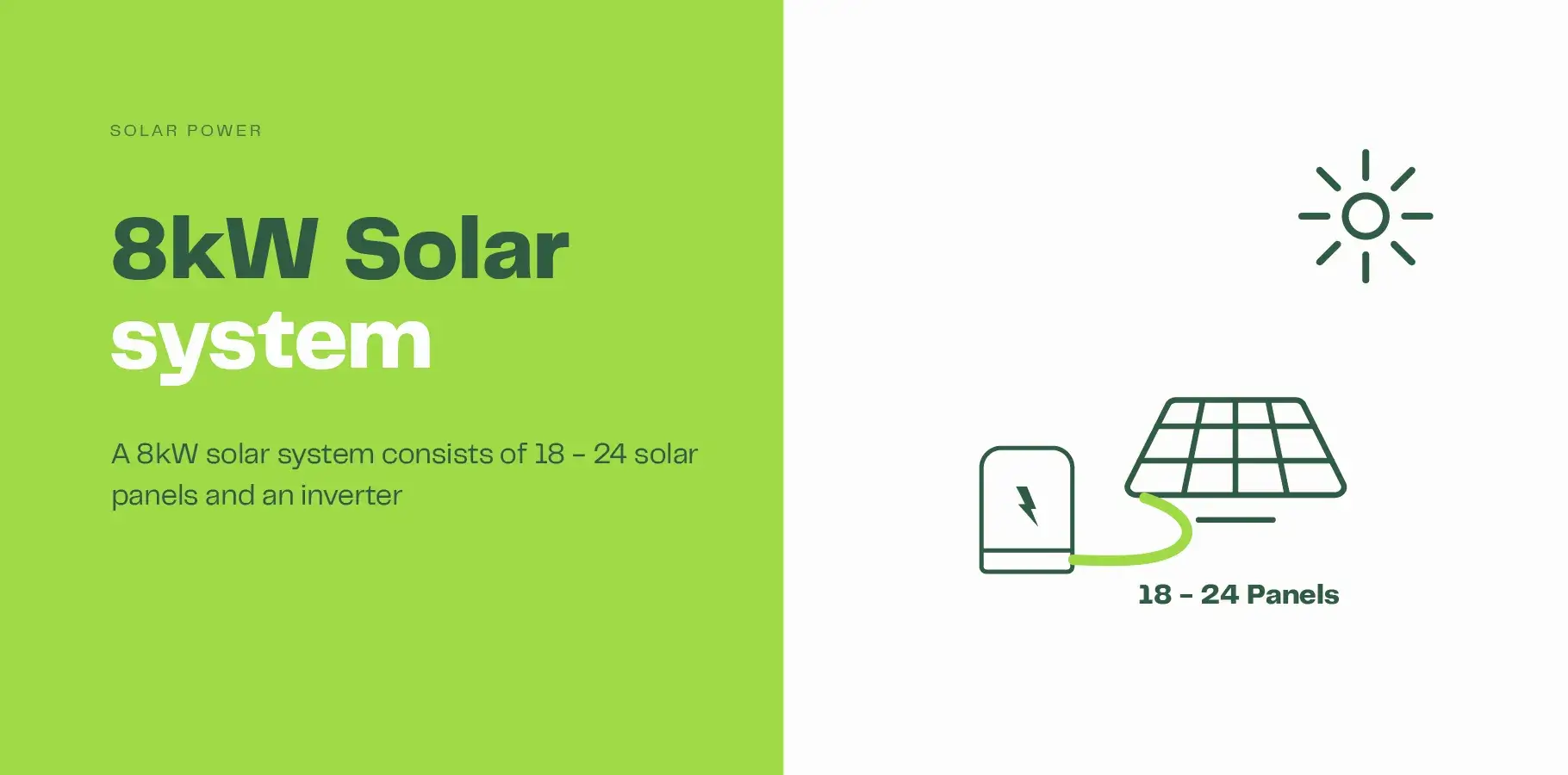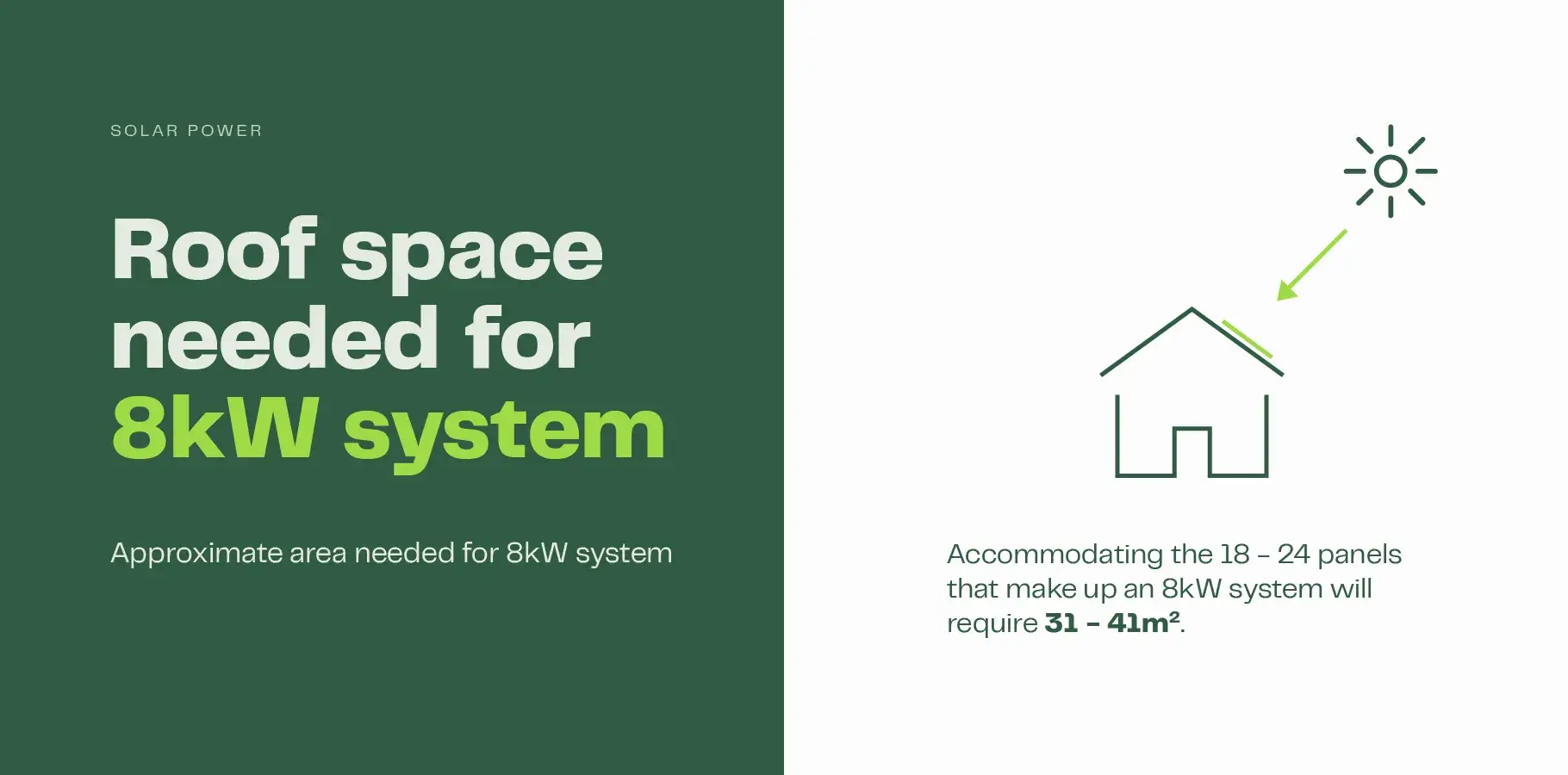8kW Solar systems
8kW Solar systems bridge the gap between two of the most popular solar system sizes on the market – the 6.6kW and 10kW system sizes.

For households with above-average energy needs, an 8kW solar system offers an appealing stop-gap solution between 6.6kW and 10kW systems while optimising available roof space. Depending on where you live, an 8kW solar system will generate as much as 35.2 kWh of energy per day in Perth and 28.8 kWh of energy per day in Melbourne.
Find out about essential pricing information, energy output, payback periods, as well as applicable solar incentives available for 8kW solar systems around Australia.
How much does an 8kW solar system cost?
The price of a good quality 8kW solar system in Australia ranges from around $6,700 to $9,800 depending on the type of system that you choose, your location, and the complexity of the install. The latest data shows that the average cost of an 8kW solar system in Australia ranges from an average price of $7,600 in Sydney to $7,945 in Melbourne.
The cost of solar systems varies in different states around Australia, so it’s important to consider the specific state and territory 8kW solar system price information below. In more competitive markets like Sydney, prices are lower for consumers as solar companies compete aggressively on price in these markets.
The table below shows the average 8kW solar system price in major cities around Australia:
| City | Price |
|---|---|
| Adelaide | $7,832.00 |
| Brisbane | $7,688.00 |
| Melbourne | $7,945.60 |
| Perth | $7,600.00 |
| Sydney | $7,672.00 |
How much energy will an 8kW solar system produce?
The average daily output from an 8kW solar system in Melbourne is approximately 28.8 kWh each day, while in Perth it is significantly higher at 35.2 kWh each day. The average residential household in Australia uses between 16kWh to 18kWh of electricity each day.
So then, an 8kW solar system is more than sufficient to meet the average residential household electricity consumption, no matter where you are in the country.
8kW system output in major cities:
| City | Solar output |
|---|---|
| Adelaide | 33.5 kWh |
| Brisbane | 33.5 kWh |
| Melbourne | 28.8 kWh |
| Perth | 35.2 kWh |
| Sydney | 31.2 kWh |
Just like any solar system, the exact output that you can expect will be contingent on a number of factors including:
- Your geographical location
- The orientation and exposure of solar panels
- Shade or any other environmental interferences
- Weather conditions & seasonality
- Efficiency of solar panels
- Temperature of panels – overheating can reduce efficiency
- Inverter efficiency
When it comes to how much energy you can expect an 8kW solar system to generate, the two biggest considerations will be your location and the weather. The amount of solar that your system generates will vary according to the season. As you might expect, your output in winter will typically be lower than in summer.
The quality and efficiency of your solar panels, as well as how well your system is maintained can also play a key role in determining the overall energy output.
Roof space required for an 8kW solar system
Solar panels are typically rated at 330 to 430 watts of power output per panel. For an 8kW system that means that you would typically require between 20 to 24 solar panels to reach 8000 watts – the same as 8kW.
Given that the average dimensions of a solar panel take up an area of 1.7m2, we can calculate that an 8kW solar system would require between 31 to 41m2 of roof space to accommodate the 20 to 24 solar panels required to reach 8000 watts. It’s important to consider that while 31 to 41m2 of roof space may be enough to accommodate an 8kW, you’ll likely want some more space to make it easy to access the panels for any future maintenance.
8kW Solar system average payback period
How long does it actually take to pay back the upfront cost of an 8kW solar system in Australia, and does it still make financial sense to invest in solar?
At the time of writing in September 2024, solar PV installations in Australia are closing in on the 4-million mark with the majority of these coming from residential properties.
As solar adoption continues to skyrocket, the associated government rebates and incentives are slowly dwindling. The flip side of that equation is that the cost of solar PV modules continues to drop.
Over the last five years alone, the solar PV module cost has dropped by an average of 39% - a cost reduction that consumers have directly benefited from, making solar more accessible and affordable than ever before.
The figures below assume an average daily electricity consumption of 20kWh marginally above the national average 18 kWh for a residential property.
| City | Cost | Daily production | Self-consumption | Feed-in tariff | Electricity price | Annual savings | Payback period |
|---|---|---|---|---|---|---|---|
| Adelaide | $7,832.0 | 33.5 kWh | 40% | $0.07 | $0.43 | $1,934.77 | 4 years |
| Brisbane | $7,688.0 | 33.5 kWh | 40% | $0.07 | $0.28 | $1,516.78 | 5.1 years |
| Melbourne | $7,949.0 | 28.8 kWh | 40% | $0.05 | $0.28 | $1,234.10 | 6.4 years |
| Perth | $7,603.0 | 35.2 kWh | 40% | $0.07 | $0.26 | $1,522.24 | 5 years |
| Sydney | $7,675.0 | 31.2 kWh | 40% | $0.07 | $0.33 | $1,576.51 | 4.9 years |
Let’s take the example of Sydney in the table above to show how those numbers work and how you can apply them to your own energy consumption and electricity prices.
Self-consumption: If the self-consumption rate (using solar to directly power your appliances) is 40% and daily electricity use is 20 kWh, then solar self-consumption is 8 kWh.
Total electricity consumption: 20 kWh x 365 days = 7300 kWh each year
Daily excess energy: With a daily energy production of 31.2 kWh and consumption of 8 kWh, there is a 23.2 kWh daily excess that can be fed back to the grid. Using the latest NSW solar rebate figures, an average feed-in tariff of 7c per kWh on this 23.2 kWh excess can be used.
Year energy bill: Given an average electricity price of $0.33 per kWh in Sydney, we can calculate the total electricity cost (7,300 kWh x $0.33 = $2,409). We also need to add on the daily supply charge, this brings the total electricity cost up to $2760. With the self-consumption rate and feed-in tariffs factored in, annual savings amount to approximately $1,576.51.
Payback period: With the total cost of the solar system being $7,675, the payback period of an 8kW solar system in Sydney is calculated at 4.9 years (4 years and 11 months) based on the annual savings.
How much could an 8kW solar system save you overall?
Using the figures above for Sydney, Australia, and considering that the average lifespan of a solar system in the country ranges from 20 to 30 years, let's focus on a 25-year lifespan as a midpoint. With a 3% annual increase in electricity prices linked to Australia's Consumer Price Index (CPI), an 8kW solar system could result in total savings of $49,781 over its 25-year lifespan.
Is it worth installing an 8kW solar system?
As we can see above, installing an 8kW solar system in Australia can lead to significant savings. Despite government rebates gradually decreasing, falling PV module costs have comfortably offset the reduced government incentives and made upfront expenses more affordable than ever.
Choosing the right solar system size will depend entirely on your property, your available roof space, and your energy requirements. Irrespective of whether you’re looking at a 3kW, 5kW, 6.6kW, 10kW, or 13kW solar system, it’s important to consider your energy consumption patterns and your property. Reviewing your recent electricity bills, consumption habits, and any applicable state and federal incentives can help you to determine the right solar system for your property.
- A guide to solar for your home
- Are solar panels worth it
- Benefits of solar panels
- A guide to 3kW solar systems
- A Guide to 4kW solar systems
- A guide to 5kW solar systems
- A guide to 6.6kW solar systems
- A guide to 10kW solar systems
- A guide to 13kW solar systems
- A guide to 20kW solar systems
- A guide to hybrid solar systems
- A guide to off-grid solar

Are you ready to compare solar quotes?
Get 3 free quotes and start your solar journey today.
Get free quotesCalculate your solar saving
With our free and trusted solar calculator.
